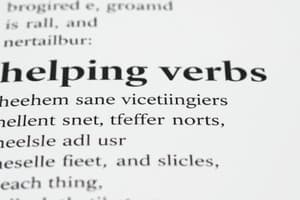Podcast
Questions and Answers
Which of the following illustrates the omission of a necessary helping verb?
Which of the following illustrates the omission of a necessary helping verb?
- She has gone to the store.
- She will go to the store.
- She is going to the store.
- She going to the store. (correct)
What is an example of using the incorrect form of a helping verb that alters meaning?
What is an example of using the incorrect form of a helping verb that alters meaning?
- He is finishing. (correct)
- He will finish.
- He finishes.
- He has finished.
Which of these sentences demonstrates an incorrect use of the helping verb 'to be'?
Which of these sentences demonstrates an incorrect use of the helping verb 'to be'?
- They is happy. (correct)
- She was laughing.
- They are happy.
- He is running.
Which of the following sentences mixes different tenses incorrectly?
Which of the following sentences mixes different tenses incorrectly?
What error is demonstrated in the sentence 'He can plays the guitar'?
What error is demonstrated in the sentence 'He can plays the guitar'?
Which of these sentences shows inappropriate placement of a helping verb?
Which of these sentences shows inappropriate placement of a helping verb?
Which statement about intransitive verbs is correct?
Which statement about intransitive verbs is correct?
Which of the following is a mistake related to neglecting subject-verb agreement?
Which of the following is a mistake related to neglecting subject-verb agreement?
Flashcards are hidden until you start studying
Study Notes
Helping Verbs: Common Mistakes
-
Misidentifying Helping Verbs
- Some may confuse helping verbs with main verbs.
- Helping verbs assist the main verb by providing additional meaning (e.g., tense, mood).
-
Omitting Necessary Helping Verbs
- Sometimes, students skip helping verbs, which can lead to incomplete or incorrect sentences.
- Example: “She is going to the store” vs. “She going to the store.”
-
Using Incorrect Forms
- Using the wrong form of a helping verb can alter the meaning.
- Example: “He will finish” (future) vs. “He is finishing” (present).
-
Overusing Helping Verbs
- Overuse can lead to wordiness or confusion in sentences.
- Example: “She has been studying for three hours” is clearer than “She has been studying for three hours now.”
-
Confusing "To be" Forms
- The various forms of "to be" (is, am, are, was, were) must match the subject and tense correctly.
- Example: “They are happy” vs. “They is happy” (incorrect).
-
Inconsistent Tense Usage
- Mixing different tenses can confuse the reader.
- Example: “She was running and will finish” mixes past and future tenses incorrectly.
-
Neglecting Subject-Verb Agreement
- Helping verbs must agree with their subjects in number and person.
- Example: “He has” vs. “They have.”
-
Using Helping Verbs with Intransitive Verbs
- Not all intransitive verbs require helping verbs.
- Example: “He sleeps” does not need a helping verb.
-
Confusion with Modal Helping Verbs
- Misunderstanding modal verbs (can, could, may, might, etc.) can lead to incorrect usage.
- Example: “He can plays” (incorrect) should be “He can play.”
-
Inappropriate Placement
- Misplacing helping verbs can disrupt the flow of a sentence.
- Example: “She has only finished her homework” vs. “Only she has finished her homework” (changes emphasis).
By being aware of these common mistakes, one can improve their understanding and usage of helping verbs in writing and speech.
Misidentifying Helping Verbs
- Helping verbs assist main verbs to clarify meaning, such as tense or mood.
- Confusion often arises when students mistake helping verbs for main verbs.
Omitting Necessary Helping Verbs
- Omitting helping verbs can result in incomplete or grammatically incorrect sentences.
- Example: “She is going to the store” illustrates proper use versus the incorrect “She going to the store.”
Using Incorrect Forms
- The form of a helping verb significantly influences the sentence's meaning.
- Future action is indicated by “He will finish,” while present action is shown by “He is finishing.”
Overusing Helping Verbs
- Excessive use of helping verbs can cause wordiness or dilute clarity.
- “She has been studying for three hours” is preferred over the unnecessarily verbose alternative.
Confusing "To be" Forms
- Proper subject-verb agreement is essential, especially with forms of "to be."
- Correct: “They are happy” vs. incorrect: “They is happy.”
Inconsistent Tense Usage
- Mixing different tenses can confuse readers and disrupt flow.
- Example: “She was running and will finish” incorrectly combines past and future tenses.
Neglecting Subject-Verb Agreement
- Helping verbs must align with the subject in number and person.
- Example: Correct usage is “He has” for singular, while “They have” is used for plural subjects.
Using Helping Verbs with Intransitive Verbs
- Not all intransitive verbs need helping verbs for correctness.
- Example: “He sleeps” correctly stands alone without needing assistance.
Confusion with Modal Helping Verbs
- Modal verbs (e.g., can, could, may) have specific rules that are often misunderstood.
- Example: Incorrect: “He can plays” should be corrected to “He can play.”
Inappropriate Placement
- The placement of helping verbs can significantly alter the sentence’s emphasis and clarity.
- Example: “She has only finished her homework” emphasizes the homework, whereas “Only she has finished her homework” changes who is emphasized.
Studying That Suits You
Use AI to generate personalized quizzes and flashcards to suit your learning preferences.




